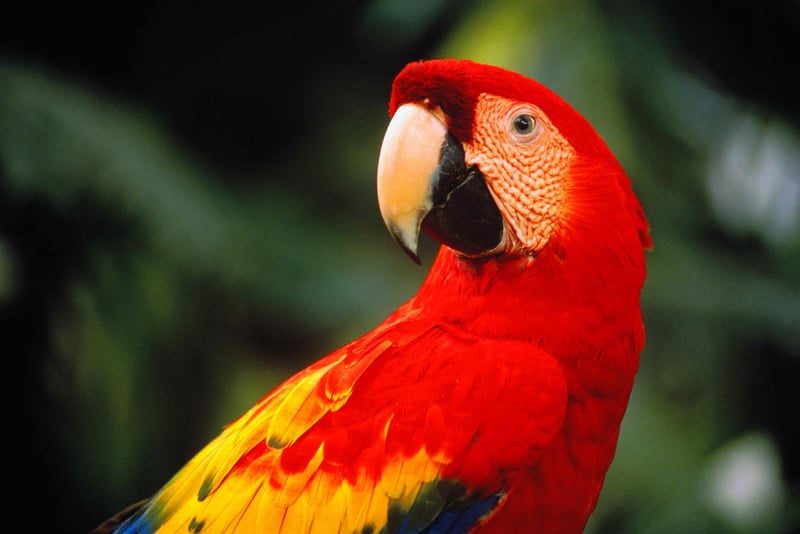
At first glance, the phrase “exotic animals” might seem harmless. Learn why using the word “exotic” to describe animals isn’t just inaccurate—it’s harmful.
At first glance, the phrase “exotic animals” might seem harmless—maybe even flattering. It conjures images of brightly colored parrots, sleek big cats, or tiny primates jumping through trees. But at World Animal Protection US, we’ve stopped using that phrase, and we think you should, too.
The word “exotic” isn’t just inaccurate—it’s harmful. It reinforces dangerous ideas that fuel the wildlife trade, normalize animal cruelty, and uphold racist and xenophobic views that have harmed both animals and marginalized communities.
Let’s break that down.
“Exotic” Is Othering—For Animals and People
The word “exotic” has a long and problematic history. As pointed out in HuffPost, calling something or someone “exotic” implies that they are different, foreign, and don’t belong. It’s a label that centers whiteness, Western culture, and Eurocentric norms as the default, while painting everything else as strange, wild, or dangerous.
And that extends beyond people. When we call animals “exotic,” we’re perpetuating the same framework. We're saying: “This animal is foreign. This animal doesn’t belong here.” And that opens the door to exploitation.
The team at Contemporary Racism notes that the word exotic “fetishizes the unfamiliar,” stripping away individuality and complexity in favor of spectacle. That’s exactly what happens when wild animals are marketed as “exotic pets.” They’re turned into Instagram props, not recognized as sentient beings who suffer when removed from their habitats or bred for profit in captivity.
The Language of the Wildlife Trade
Words like “exotic animals” make the wildlife trade sound glamorous. In reality? It’s a multibillion-dollar industry built on cruelty, captivity, and destruction. Wild animals—like snakes, tigers, monkeys, and parrots—are stolen from their homes or bred in captivity to be sold as “pets,” displayed in roadside zoos, or used in performances.
Labeling these animals as “exotic” masks that cruelty. It sells the illusion of rarity and prestige while hiding the pain and suffering behind the scenes.
Instead of calling a slow loris an “exotic pet,” we need to call them what they are: a wild animal being exploited for profit.
Racism, Xenophobia, and “Exotic” Foods and Animals
The same harmful framing applies to food, too. As The Washington Post explains, the term “exotic” has been used to stigmatize foods from non-Western cultures—especially from Asian, African, and Latin American communities. It implies that these traditions are weird or even disgusting, reinforcing xenophobic attitudes and contributing to racism.
When we extend that mindset to animals, we’re upholding the same harmful structures. It’s no coincidence that the animals most often labeled “exotic” tend to come from the Global South. The framing of these animals as “dangerous” or “unusual” often mirrors how Western culture has historically framed people from these same regions.
As Varsity writes, “Words create hierarchies,” and when we call some animals “exotic,” we create a hierarchy that justifies ownership, exploitation, and othering.
Evolving With Our Values
You may come across older content from World Animal Protection that uses the term “exotic animals,” and that’s okay—we’re not perfect, and our journey is always evolving.
We’re proud to say we’ve updated our language to better reflect our mission and values. Language is powerful, and as we learn and grow, so does the way we communicate. Moving away from “exotic animals” is part of our commitment to justice—for animals, for people, and for the planet. We’ll always strive to do better, and we welcome accountability when we fall short.
So What Do We Say Instead?
At World Animal Protection US, we call animals what they are: wild. Not exotic. Not weird. Not foreign. Wild. Because no matter where an animal is from, they belong in the wild—not in a cage, a tank, a pet store, or in a TikTok.
Words matter. Language shapes laws, public opinion, and policy, and using “wild animal” instead of “exotic animal” helps reframe how we see them—not as property or curiosities, but as individuals with the right to live freely in their natural habitats.
Take Action With Us
Together, we can change the narrative. We can stop the use of harmful language that fuels cruelty and marginalization, and we can fight for a world where wild animals stay in the wild—where they’re respected, protected, and never exploited.
Join our fight to end the wildlife trade and protect animals everywhere. Donate to support World Animal Protection today.